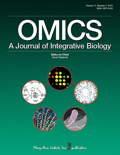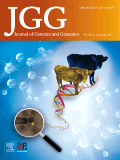
OMICS-A JOURNAL OF INTEGRATIVE BIOLOGY
Scope & Guideline
Connecting disciplines to illuminate the complexities of life.
Introduction
Aims and Scopes
- Genomic and Transcriptomic Research:
The journal publishes studies that explore the genome and transcriptome of various organisms, focusing on gene function, expression regulation, and evolutionary insights. - Metabolomics and Proteomics:
Research that investigates the metabolome and proteome to understand metabolic pathways and protein functions in different biological contexts is a key area of focus. - Bioinformatics and Computational Biology:
The journal emphasizes the development and application of bioinformatics tools and computational methods for analyzing large omics datasets, enhancing data interpretation and integration. - Functional Genomics and Gene Regulation:
Studies exploring gene regulation, including the roles of non-coding RNAs and epigenetic modifications, are commonly featured, highlighting their impact on phenotypic traits. - Host-Pathogen Interactions:
Research examining the molecular mechanisms underlying interactions between hosts and pathogens, including the genetic basis of resistance and susceptibility, is prominently represented. - Environmental and Stress Responses:
The journal includes research that investigates how organisms adapt to environmental changes and stressors at the molecular level, providing insights into resilience mechanisms.
Trending and Emerging
- Integrative Multi-Omics Approaches:
There is a significant increase in research that combines genomics, transcriptomics, proteomics, and metabolomics to provide a comprehensive understanding of biological processes. - Machine Learning and AI in Genomics:
The application of machine learning and artificial intelligence in analyzing omics data is on the rise, facilitating the discovery of patterns and predictive models in complex datasets. - Epigenetics and Gene Regulation:
Research exploring epigenetic modifications and their role in gene regulation and expression dynamics is gaining prominence, reflecting a deeper understanding of gene-environment interactions. - Climate Change and Environmental Genomics:
Studies focusing on how organisms adapt to climate change and environmental stressors through genomic and transcriptomic analyses are increasingly prevalent. - Host-Microbiome Interactions:
Research investigating the interplay between host organisms and their microbiomes, particularly how these interactions affect health and disease states, is emerging as a crucial area of interest.
Declining or Waning
- Traditional Genetic Studies:
Research focused solely on traditional genetic studies, such as simple Mendelian inheritance patterns, appears to be declining in favor of more integrative omics approaches. - Single-Omics Studies:
Papers that concentrate on a single omics layer (e.g., genomics without integration with transcriptomics or proteomics) are becoming less common as the field moves towards multi-omics integration. - Descriptive Studies without Functional Insights:
There is a noticeable decrease in studies that merely describe genomic or transcriptomic data without providing functional or biological insights, as the field increasingly values functional genomics.
Similar Journals

MOLECULAR & CELLULAR PROTEOMICS
Exploring the intersection of biochemistry and analytical chemistry.MOLECULAR & CELLULAR PROTEOMICS, published by Elsevier, stands as a premier journal in the fields of Biochemistry, Analytical Chemistry, and Molecular Biology, with a distinguished Q1 ranking reflecting its high impact and contribution to the scientific community. Established in 2002, this journal has consistently provided a platform for the latest research in protein science, merging molecular biology with advanced analytical techniques. With impressive Scopus rankings—41st in Biochemistry and 16th in Analytical Chemistry—it caters to an audience of researchers, professionals, and students eager to explore cutting-edge developments in proteomics. Although currently not designated as open access, the journal aims to foster knowledge dissemination through accessible research content. As it continues to evolve until 2024, MOLECULAR & CELLULAR PROTEOMICS is essential for anyone passionately engaged in the ever-expanding field of proteomics.

Algorithms for Molecular Biology
Empowering researchers with open access to transformative methodologies.Algorithms for Molecular Biology, published by BMC, is a premier Open Access journal dedicated to advancing the field of molecular biology through innovative computational methods. Since its inception in 2006, the journal has provided a vital platform for researchers to share their findings and methodologies, covering a diverse range of topics at the intersection of applied mathematics, computational theory, and molecular biology. With a notable impact factor reflected in its Scopus ranks, including a Q2 classification in both applied mathematics and computational theory, as well as Q3 in molecular and structural biology, the journal plays an essential role in this rapidly evolving discipline. The wide accessibility of articles published under the Open Access model ensures that research findings reach a global audience, fostering collaboration and innovation amongst scientists and professionals alike. As we look towards converging years from 2006 to 2024, Algorithms for Molecular Biology continues to uphold the highest standards of scientific integrity and excellence, reinforcing its status as a key resource for those engaged in the profound complexities of molecular biology.

JOURNAL OF GENE MEDICINE
Advancing the Frontiers of Gene TherapyThe Journal of Gene Medicine, published by Wiley, stands as a pivotal resource in the field of gene therapy and molecular medicine, with a rich history of dissemination of impactful research since its inception in 1998. With an ISSN of 1099-498X and an E-ISSN of 1521-2254, this esteemed journal plays a crucial role in advancing our understanding of genetics and drug discovery, reflected in its impressive 2023 Scopus rankings where it holds a Q2 classification in Drug Discovery and Q3 in several genetics-related categories. The journal aims to facilitate the exchange of high-quality research findings that bridge the gap between laboratory and clinical applications, making it an essential platform for researchers, academics, and healthcare professionals committed to the forefront of genetic innovation. Although it does not currently offer open access options, its reputation for rigorous peer review ensures that all published work meets the highest academic standards, providing a reliable reference for scientific inquiry in the United States and beyond. As the field rapidly evolves, the Journal of Gene Medicine remains at the helm, guiding future discoveries with its influential publications and comprehensive insights.

G3-Genes Genomes Genetics
Empowering Global Collaboration in Genetic DiscoveryG3-Genes Genomes Genetics is a prominent open access journal published by Oxford University Press, Inc., dedicated to advancing the field of genetics and genomics. Since its inception in 2011, the journal has become a vital resource for researchers, professionals, and students, featuring high-quality, peer-reviewed articles that cover a broad spectrum of topics within genetics, including clinical genetics and molecular biology. With an impressive standing reflected in its 2023 Scopus rankings, which positions it in the Q2 category for Genetics (Clinical) and Q1 for Medicine (Miscellaneous), G3 remains at the forefront of scholarly communication in these disciplines. The journal's commitment to open access ensures that cutting-edge research is accessible to a global audience, stimulating collaboration and innovation in the field. For those eager to explore the latest in genetic research, G3 serves as an indispensable platform, inviting contributions that push the boundaries of scientific understanding.

Communications Biology
Exploring Innovative Pathways in Life SciencesCommunications Biology, published by NATURE PORTFOLIO, is a premier open-access journal that has been at the forefront of biological sciences since its inception in 2018. With a remarkable impact factor and a strong reputation in the field, it has achieved prestigious Q1 rankings in Agricultural and Biological Sciences, Biochemistry, Genetics and Molecular Biology, and Medicine, highlighting its significance in disseminating cutting-edge research. The journal is renowned for its focus on innovative, interdisciplinary biological studies, making it an essential platform for researchers, professionals, and students alike, eager to contribute to and engage with the latest discoveries. With its commitment to accessibility, all articles published are openly available to the global research community, furthering the collaboration and advancement of knowledge in the biological sciences. For more information, access options, and submission guidelines, please visit the journal's website.

FEBS Open Bio
Nurturing collaboration in the evolving landscape of biosciences.FEBS Open Bio is a leading open-access journal published by Wiley, dedicated to advancing our understanding of biochemistry, genetics, and molecular biology. Since its inception in 2011, this journal has provided a robust platform for researchers to share their findings with a wider audience, ensuring the dissemination of high-quality scientific knowledge. With an impact factor reflecting its stature in its field, FEBS Open Bio is ranked #77 out of 221 in general biochemistry, genetics, and molecular biology, placing it in the 65th percentile among its peers. This journal serves as an essential resource for professionals, researchers, and students alike, fostering collaboration and innovation within the scientific community. The commitment to open access not only enhances visibility but also promotes transparency in research, making it a vital contributor to the ongoing dialogue in biochemical and molecular biological sciences. For those looking to stay at the forefront of research developments, FEBS Open Bio is a key publication addressing the latest trends and discoveries in the field.

MOLECULAR GENETICS AND GENOMICS
Unraveling the Complexities of Life at the Molecular LevelMOLECULAR GENETICS AND GENOMICS is a distinguished journal published by SPRINGER HEIDELBERG that serves as a pivotal platform for the communication of cutting-edge research and developments in the fields of genetics, molecular biology, and medicine. With an ISSN of 1617-4615 and an E-ISSN of 1617-4623, this journal has established itself since its inception in 1994 as a significant resource for researchers aiming to explore the complexities of genetic interactions and their implications in various biological systems. The journal is indexed in Scopus, with respectable rankings in the Genetics, Molecular Biology, and Biochemistry categories, showcasing its position within the academic community. It is categorized in the 2023 rankings as Q3 in Genetics, Q2 in Medicine (miscellaneous), and Q3 in Molecular Biology, indicating its relevance and quality in the scientific discourse. The journal also promotes open access, ensuring that researchers and professionals can easily share and advance knowledge in the rapidly evolving disciplines of molecular genetics and genomics. As the journal continues to bridge the gap between experimental and theoretical research, it presents a vital space for innovation, fostering collaborations and scholarly exchange among its readership.

GENETICA
Exploring the Genetic Basis of Biological DiversityGENETICA is a prominent journal published by SPRINGER, dedicated to advancing the field of genetics and its applications across various biological disciplines, including animal science, plant science, and insect science. Since its inception in 1919, the journal has consistently served as a vital platform for researchers and professionals to disseminate high-quality research findings that explore the genetic bases of biological phenomena. With its current scope spanning from 1943 to 2024, GENETICA holds a commendable position in the academic community, as evidenced by its Q2 ranking in both animal science and insect science, and its active contribution to interdisciplinary studies in genetics. Although the journal does not offer open access, it remains accessible through institutional subscriptions and libraries, ensuring its vital research is widely circulated. Researchers, professionals, and students alike will find GENETICA an invaluable resource for the latest discoveries and methodologies in the ever-evolving landscape of genetics.

Journal of Genetics and Genomics
Unraveling the Complexities of Genomic ScienceThe Journal of Genetics and Genomics, published by SCIENCE PRESS in China, stands as a significant contributor to the fields of Genetics and Molecular Biology. With an ISSN of 1673-8527 and E-ISSN 1873-5533, this esteemed journal has achieved a remarkable reputation, holding a prestigious Q1 ranking in both Genetics and Molecular Biology as of 2023. This journal not only showcases pioneering research but also fosters vital discussions on contemporary challenges and innovations within genomic sciences. As part of its commitment to facilitating scientific advancement, the journal encompasses a range of research articles, reviews, and short communications, all aiming to illuminate the complexities of genetic structures and functions from 2007 to 2024. Researchers, professionals, and students alike are encouraged to engage with its content, which ranks favorably in Scopus—placing it within the top tier of its categories. Join the community of academic excellence and explore the latest findings that shape our understanding of genomics.

GENOME BIOLOGY
Advancing the frontiers of genomics and molecular biology.GENOME BIOLOGY is a premier, peer-reviewed journal published by BMC, focusing on the rapidly evolving fields of genomics, molecular biology, and bioinformatics. Accessible as an Open Access journal since 2000, it aims to disseminate high-quality, cutting-edge research that contributes to our understanding of genome biology's intricate mechanisms. The journal boasts an impressive impact, ranking 8th in Agricultural and Biological Sciences and 9th in Biochemistry, Genetics and Molecular Biology, highlighting its significance among scholars, professionals, and students alike. With a commitment to facilitating the exchange of invaluable scientific knowledge, GENOME BIOLOGY provides an important platform for discussions on evolutionary biology, genetic systems, and cell biology, contributing to the advancement of these dynamic disciplines.